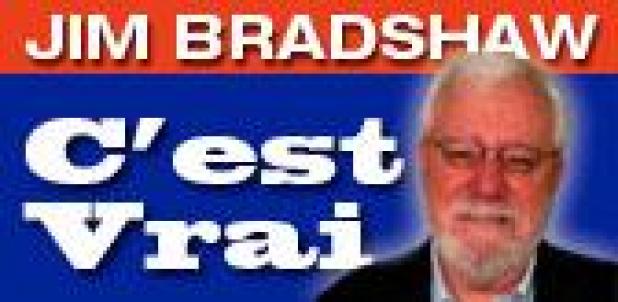
Jim Bradshaw: Priest prayed during early Indian encounter
Just 15 years before the Civil War, much of southwest Louisiana was still a sparsely settled and semi-wild place.
It wasn’t until the railroad finally crossed the prairies in the early 1880s that settlers began to move here in large numbers, towns began to spring up, and commercial agriculture began really to take hold.
Father P.F. Parisot, a missionary priest who came from Texas, visited the Imperial Calcasieu region, as the land between the Sabine and Mermentau River was called, in 1852.
He spent 2½-months in the area, “ending with a visit to Lake Charles and its three Catholic families.”
They told him he was the first priest to come to the area for at least 20 years.
Somewhere in Calcasieu Parish, he visited the remnant of an Indian tribe which he called Carahchuas, which were probably a band of either Attakapas or Opelousas Indians, and later had a chance encounter with a group scary enough to make him say what he thought could be his final prayers.
“After crossing the Sabine River, I visited Calcasieu Parish, an immense district in Louisiana, [where] crossing bayous and bottoms, marshes and bogs, sleeping out and getting lost on the pathless prairies were of frequent occurrence,” he wrote in his autobiography ("The Reminiscences of a Texas Missionary," San Antonio, 1899).
He noted that crossing bayous and rivers wasn’t that easy in those days.
There were no bridges and bayous were “numerous and deep.” The priest wrote that “my … method of crossing them was to hold my horse by the tail with one hand and paddle with the other.”
He baptized 11 infants at the Indian settlement, where “a Creole gentleman who spoke the dialect of the tribe stood as sponsor.”
The chief, “a stout man of 85, who knew a little broken English,” told the priest that “a long time ago he was owner of all the country around.”
His tribe, he said, was then “plenty, plenty,” but now was “no more big.” The chief said he was the doctor for the whole district, “his pharmacy consisting of herbs, flowers, and roots of the prairie and forest of his kingdom.”
Father Parisot baptized the chief’s daughter, who was then 50 years old and who came from “a considerable distance” with her two children, who were also baptized.
“Turning toward the Sabine River,” Father Parisot wrote, “I met a crowd of Indians in the woods who nearly frightened the life out of me. Were they gentle or wild? I said my Act of Contrition, and when they drew near, I tried to look pleasant and bade them good evening. They muttered a few words and passed by. My fear abated and my heart beat more regularly.”
He may have been unduly alarmed because he was a newcomer to the “wild west” at the time of that first trip, having left France in March of 1852 as part of a group of “six Oblate Fathers and one Lay Brother, accompanied by four Nuns of the Incarnate Word, two Ursuline Sisters, four Brothers of Mary, and eighteen seminarians.”
According to his autobiography, the group spent 52 days “between the immensity of the firmament and the immensity of the ocean” sailing from La Havre, to New Orleans. He then sailed from New Orleans to Galveston, “a city of 6,000 souls.”
Father Parisot made at least two more trips to Calcasieu Parish.
On the second trip he was helped by “a French gentleman named Pujo” who was about to sail down the Calcasieu in a little boat. The priest accepted Pujo’s invitation to go with him and “baptized on both sides of the river while the captain sold his goods.”
On the third trip, probably in 1854, he brought with him Father Andre Borias, who was then assigned to the mission at Galveston and who later became pastor at Beaumont. Borias visited Imperial Calcasieu regularly until perhaps as late as 1856, after which priests from Opelousas took over the missionary work in southwest Louisiana.
A collection of Jim Bradshaw’s columns, "Cajuns and Other Characters, is now available from Pelican Publishing. You can contact him at jimbradshaw4321@gmail.com or P.O. Box 1121, Washington LA 70589.
